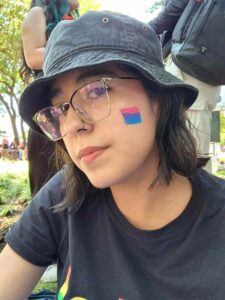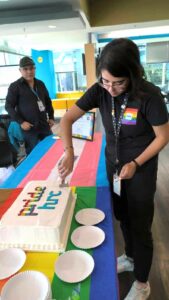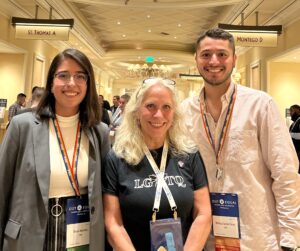Interview by Robyn Ochs
Diana Martínez (she/her/ella) is a software engineer and leader of the Pride Employee Resource Group (ERG) at Intel in Mexico. I met Diana in 2022 at the Out & Equal Workplace Summit in Las Vegas, Nevada, where she co-facilitated a session titled “Gaslighted: Imposter Syndrome and Erasure in the Bi+ Community” with fellow Mexican bi+ advocate Rodrigo Castro Flores. In addition to being drawn to Diana’s warm and welcoming presence, I was impressed by the quality of her session and by her commitment to being out and proud at work.

Robyn: Diana, please tell us about yourself.
Diana: Born and raised in the small town of Colima, Mexico, I traded beaches for a city landscape in 2019, seeking better engineering opportunities. Living alone has its challenges, but at 27 years old my sanity is (sometimes) saved by my friends, partner, video game escapes, and mountains of great books. Add in a passion for ballet, anime, and several kinds of activism, and you’ve got me. It’s these passions that keep me grounded, remind me to laugh, and give me strength to continue moving forward and fighting for the things I believe in.
R: How did you come to identify as bi?
D: I don’t know the exact date, but I remember the feelings. It felt like a sudden epiphany after a slow unraveling of events. It dawned on me, not with joy, but with a mix of fear, uncertainty, and loneliness.
For my entire life, I have always felt something for girls (and non-men in general, though those identities were not a common thing in my small town). But I always felt certain about guys too, and exploring those feelings was safe, validated by my family and society around me.
In kindergarten, I only had girlfriends. Being friends with boys meant I liked them “romantically,” whatever that meant to me at five. Family members would gush, “Aw, you look so cute together. Is Pablo your boyfriend?”, which wasn’t fun, just confusing. Back then, romance seemed like a mandatory part of being a girl, a puzzle piece I wasn’t sure I wanted to fit.
Junior high was brutal. My self-esteem plummeted, especially during the later years. I think part of the reason for my not realizing my bisexuality earlier was that whenever I noticed a girl who I thought was pretty, my brain would shut down. Instead of enjoying her beauty, I’d feel threatened, envious, like she was prettier than I could ever be. Back then, and even today, girls’ worth seems tied to their appearance, or how much boys like them. So, I chased validation from boys, and whenever I got it, I held onto it. Trying to find myself while performing what society expected wasn’t easy.
High school was when my first non-men crush happened (not that I realized this at the time). Andrea was so charming, and smart, and she was so cool, and I wanted her to think I was cool too. I wanted to hang around, learn her secrets, make her smile. But my little “heterosexual” brain said, “Of course you want to hang with cool people, and noticing girls are pretty is normal too—we all have eyes.” It was so confusing, but I thought nothing of my feelings and tried to stay friends, but not too close.
Growing up in Mexico, much of my understanding of LGBTQ+ people was shaped by TV. Every portrayal of gay men revolved around exaggerated femininity, flamboyant mannerisms, and jokes that made them look bad and annoying. It was a caricature, not a reflection of reality, yet it became the sole image I had. In a world where “gay” meant undesirable, and I liked boys, the equation seemed simple: I must be straight. The absence of any other option, any positive or diverse representation, left me feeling that liking girls was somehow part of being straight too.
College brought my feelings into focus, but I didn’t process them. Girls were suddenly more than just “pretty”—they were captivating. I could picture kissing them, but it felt like straight-girl fantasies. My shyness made exploring any of it impossible, and guys being interested in me just muddied the waters. I was a mess of wanting, confusion, and uncertainty.
I think there were a couple things that had to happen for me to come out, and they happened in this order:
My LGBTQ+ understanding grew, and I got to know other terms and concepts. My sister, a fierce advocate for women and LGBTQ+ rights, often was sharing posts and stories about queer women, or talking to me about what she had read/learned. The idea of bisexuality resonated, but it didn’t click instantly. My feelings were buried, categorized as “straight-girl stuff,” but I think I planted a seed I was going to start watering.
I kissed my (girl) friend. She of course did it as a joke, or not thinking too much about it, but I liked it, and I then realized I was always looking for ways to get her to do it again.
I realized my feelings were probably not the norm for straight girls. I saw a Facebook video of a dancing girl, and she was captivating, to say the least. Then I read the comments of the girl that had posted it and her friends, and they were mostly talking about how much they wish they were her, or how they’d love to dance like that. I still have those thoughts sometimes of course, but I felt maybe a little surprise. It made me wonder, “Are they not experiencing any attraction? Or are they just not commenting on it? Is feeling mesmerized the “straight-girl” experience?”
I saw an image of different pie charts with combinations of “men, women, nonbinary” with different percentages that said: “All valid, all bisexual.” Wait, bisexuality could be… unique? Not a fixed formula, but a broad spectrum? Maybe all along, my desires had whispered “bisexual,” even if in a different shade than others. I started questioning my feelings more, and considering the possibility of what I might be, what I might have been all along.
A girl at work. She was stunning, cool, totally out of my league. Once I almost ran into her, and she smiled so brightly and said, “Sorry,” and I wanted to cry because I really wanted to kiss her and hold her hand, and brush her hair out of her face and, holy cow, I think, these thoughts aren’t “straight.” I do like girls for real. What do I do?
Reddit became my late-night refuge. Scrolling through endless threads, I finally saw reflections of myself—stories of bisexuality that defied the binary, that were discovered late, that had been masked as straight for too long. I wasn’t alone. But “bisexual”? It felt big, scary. Could I actually say it? Was it really me?
I am proud and thankful for all the bi people that are brave and strong and share their stories so people like me can find ourselves. I have not yet settled. Every day is a new discovery, but I’m more excited than scared of what I feel and what awaits me.
R: What, if any, is your religious background, and what impact did this have on your coming out? Did it make it harder or easier? In what ways?
D: Catholicism ruled my childhood, just like it did for most kids in Mexico. You could always hear whispers at the dinner table, aunts and uncles critiquing Susana for “abandoning” her family for another woman, which painted a stark picture of what “normal” looked like. I don’t think I actively judged queer people, or felt being queer was wrong, but those whispers seeped into me, leaving a residue of doubt about anything outside the heteronormative script. Every telenovela (soap opera) reinforced the message that love meant a man and a woman, forever and ever. And that really set some expectations in my brain. I had left church way before I came out, because I stopped believing what the church preached and because I felt uncomfortable about their alienation of different minority groups. And I think doing that set me free to fully accept myself once I realized I wasn’t straight.
R: What is your city’s sexual minority community like? Are bi+ folks well-integrated into this community?
D: I don’t hang out much in my city’s LGBTQIA+ scene, mostly doing activism within my company and closer circles. However, when I do, biphobia still bites. Being in a long-term relationship with a cis man means I am always questioned or confronted about the validity of my identity. Not fitting their bisexual expectations, I am always assumed to be straight, which hurts. One of my friend’s best friends also attacked him about his sexual encounters because he was convinced my friend was gay and not bi. This biphobia makes it tough for us to find each other and feel truly welcome.

February 2023, celebrating Intel Mexico getting the “Mejores lugares para trabajar LGBTQ+” (Best places to work for LGBTQ+ equality Certification from the Human Rights Campaign)
R: What is the legal and cultural situation for LGBTQ+ people in Mexico and in the area where you live?
D: Same-sex marriage has not been legal for long in the state in which I live, even if it’s recognized as the state with the most openly queer people in Mexico. Different from Mexico City, where it was legalized in 2010, Jalisco approved it in 2016 and in April 2022 finally it was law in the whole country.
In 2022, Jalisco banned conversion therapies and recognized trans people’s identities, which is very late considering when it happened in other states (e.g., 2014 in Mexico City)—finally, some legal protection for a community so often ostracized. Yet gaps remain. Non-binary identities, for example, still navigate a legal and social limbo. Homophobia and transphobia remain pervasive, evidenced by the constant stream of hate crimes across the country. Amidst the challenges, though, glimmers of hope appear. Recently, an openly trans woman captivated the nation by winning one of our most popular reality shows. Her grace, humor, and genuine connection with TV viewers broke down barriers, humanizing the “trans” label for millions. This might just be the start of a shift in national consciousness, showing the country that queer people deserve not just tolerance, but love and respect.
R: What words are used to describe lesbian, gay, bi, or non-heterosexual people in your country? How do people who experience their gender as non-binary engage with pronouns?
D: Words for LGBTIQA+ people in Spanish are very much the same as in English: lesbianx, gay, bisexual, intersex, trans (transgénero), queer, asexual, arrománticx. We have slang too, often coming from former slurs, but they’re less widely used. The gendered part of our language is where it gets tricky. You may have noticed I used the X like you do when writing Latinx, which basically works like a placeholder (or variable) that you can substitute for the letter of your preference: A, E, O. Words in Spanish have either female or male pronouns—there is no neutral. La silla (the chair), el baño (the bathroom), la casa (the house), el pan (the bread). Then there is also the generic masculine, which uses the masculine version of words in plural to refer to mixed groups of people:
Friends, regardless of gender: amigos
Friends, only male: amigos
Friends, only women: amigas
Friends, only nonbinary: n/a (no word exists yet)
Imagine facing daily microaggressions simply because language doesn’t recognize your existence. We basically had to invent new words and add the “-e” termination to gendered terms, so your non-binary friend is not your amigo or amiga, it’s your amigue. While resistance lingers, with arguments like, “It’s not in the dictionary,” a hopeful shift is brewing. People tend to use it in written communications more and more, though unless actively talking to a person who uses they/them pronouns, speaking has not changed as fast. Platforms like Netflix now use these terms in their subtitles, and younger generations readily embrace these new terms. This growing awareness sparks optimism that official linguistic bodies will eventually recognize and endorse these changes, paving the way for a more inclusive Spanish that reflects the vibrant spectrum of identities it serves.
R: How did you end up getting involved in LGBTQ+ workplace advocacy? What is going on at Intel, the company where you work?
D: I have been involved in my company’s LGBTQ+ group for four years now. I started as an ally and then, inside, I found a community that gave me the comfort I needed to safely come out. Being at Intel, a US company, we have access to support from groups abroad, but there are also the unique local context and cultural aspects to consider in Mexico. The pandemic nearly killed the group: we were down to three members out of 1300+ employees, and that basically forced me to take the lead. I couldn’t fathom the idea of LGBTQ+ employees not having a safe space, so I stepped up. Saying it was hard is an understatement, but we somehow managed to survive and grow a bit these past couple years. We are currently working on a strategy to get more people involved, sensitize all employees, and provide them with education and an understanding of the world around them, while ensuring Intel in Mexico is up to date with politics and actions that protect and empower queer employees.
R: Where would a person living in Mexico find bi+ support or resources, inside or outside your country? Are there Spanish-language LGBTQ+ websites inside or outside of Mexico that you have found useful? What about publications?
D: Discovering bisexual resources or support in a world that often overlooks us is no easy feat. I did however manage to find some women with a group called Bisexualas México. Their vibrant website overflows with resources, and their book, Vivencias Bisexualas, became a cherished map of shared experiences. I have found a large number of media recommendations to explore, organizations in different states and countries, terms, and bibliographies that really helped me find a place and to overall feel less alone.
Robyn Ochs is a speaker, bi+ and LGBTQ+ advocate, and co-editor of BWQ and two anthologies, Getting Bi: Voices of Bisexuals Around the World and RECOGNIZE: The Voices of Bisexual Men.

Diana with Robyn and Rodrigo Castro Flores at the Out & Equal Workplace Summit, Las Vegas, Nevada, October, 2022
